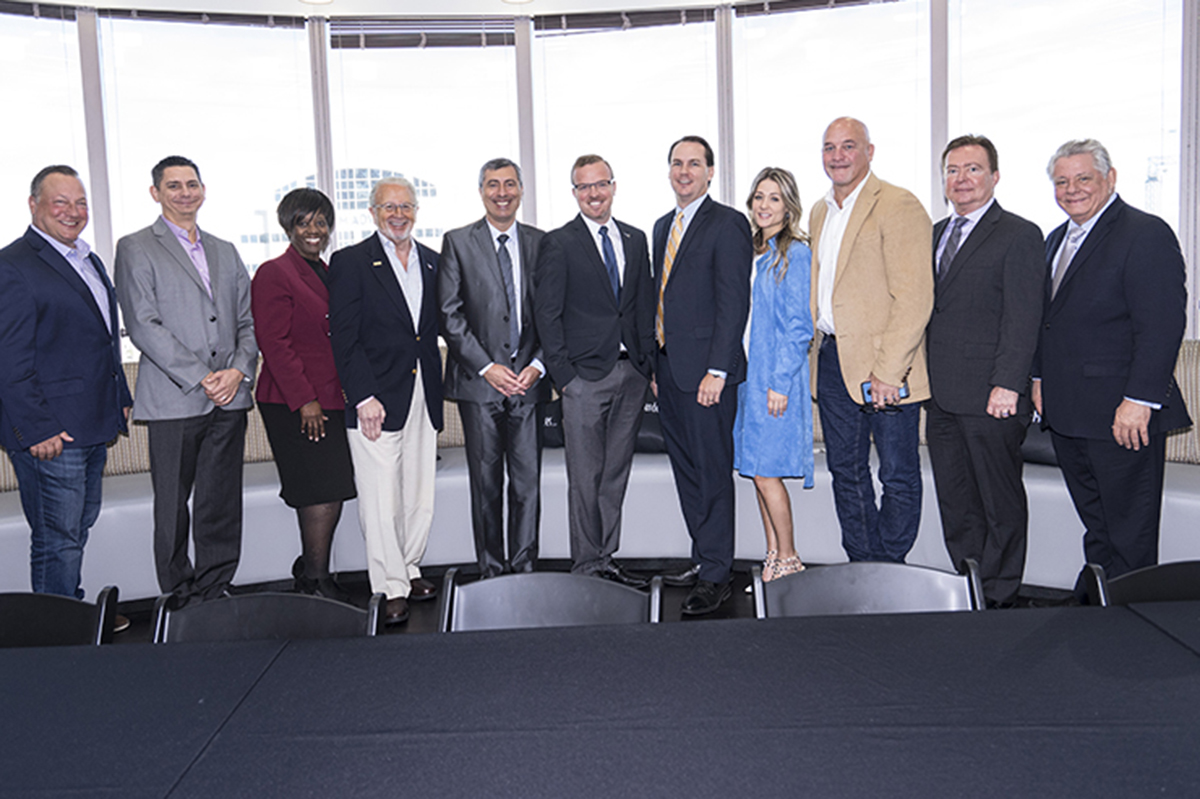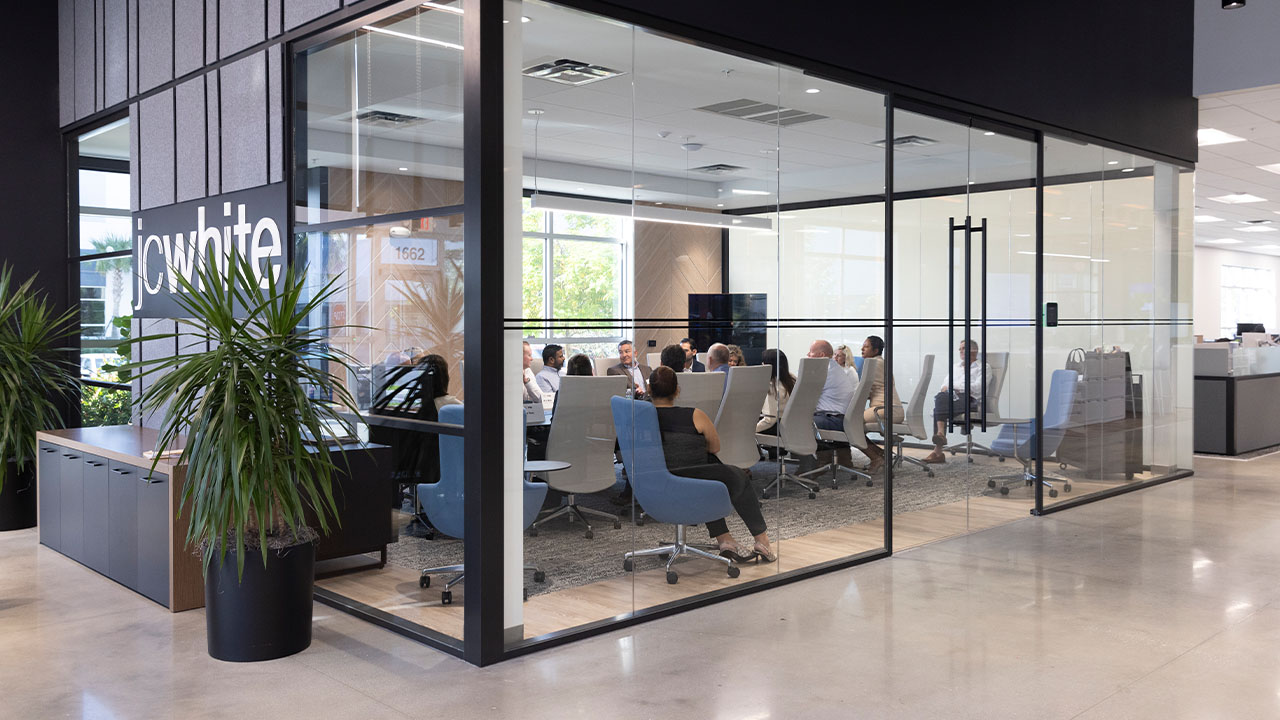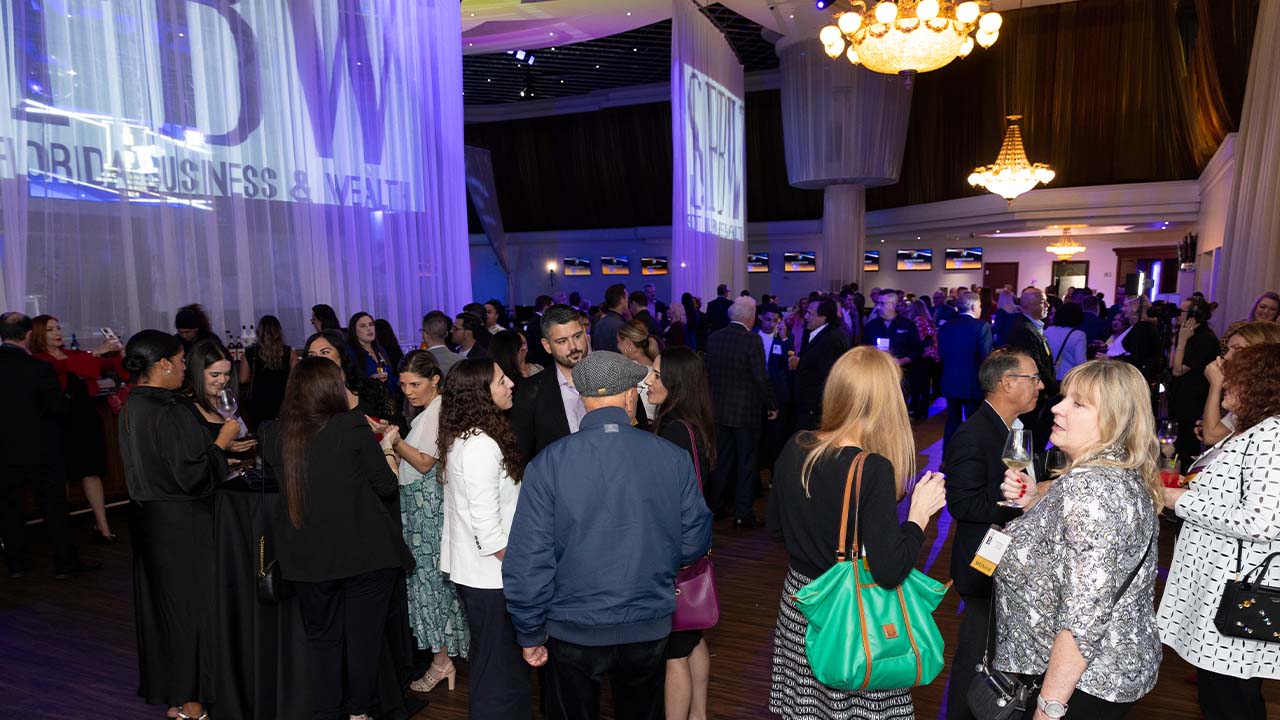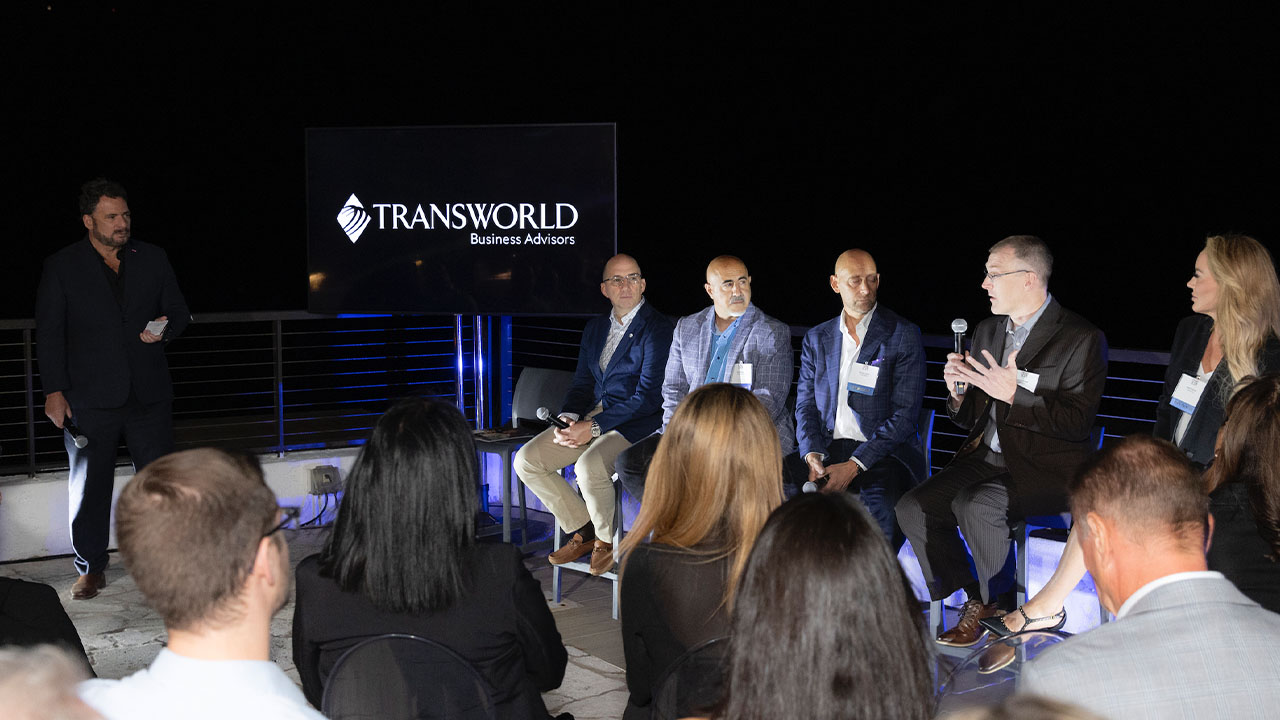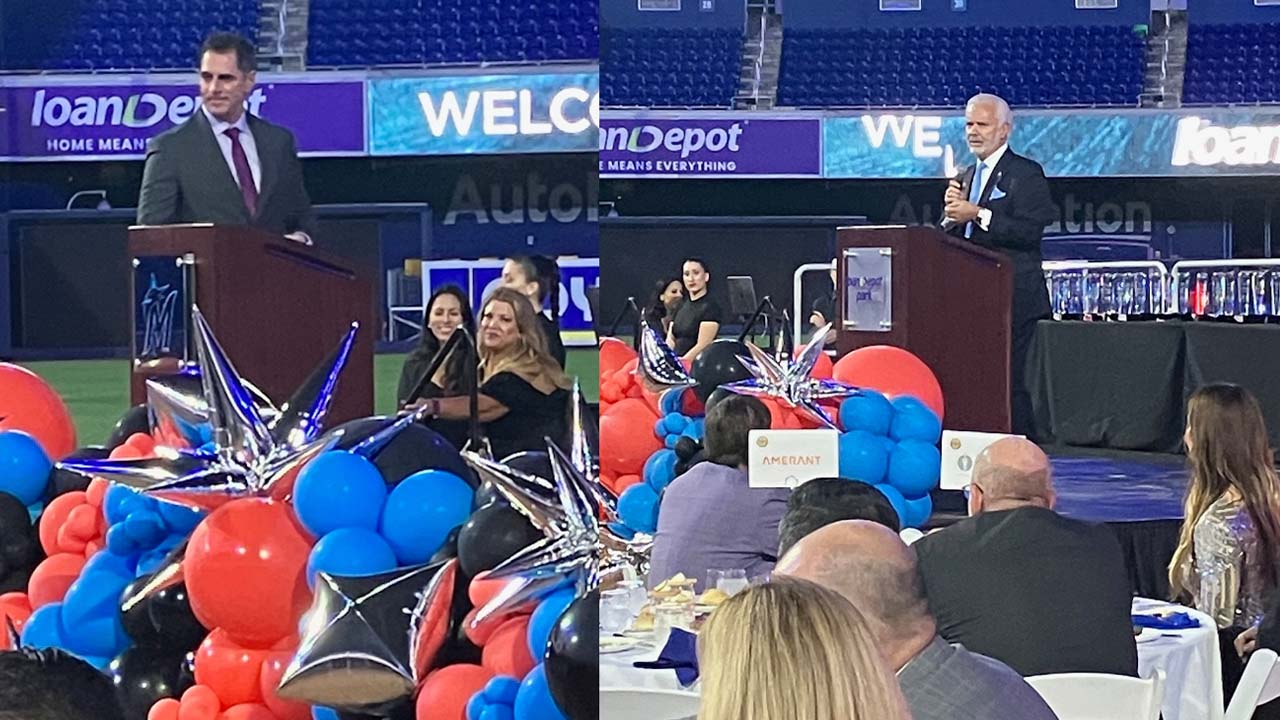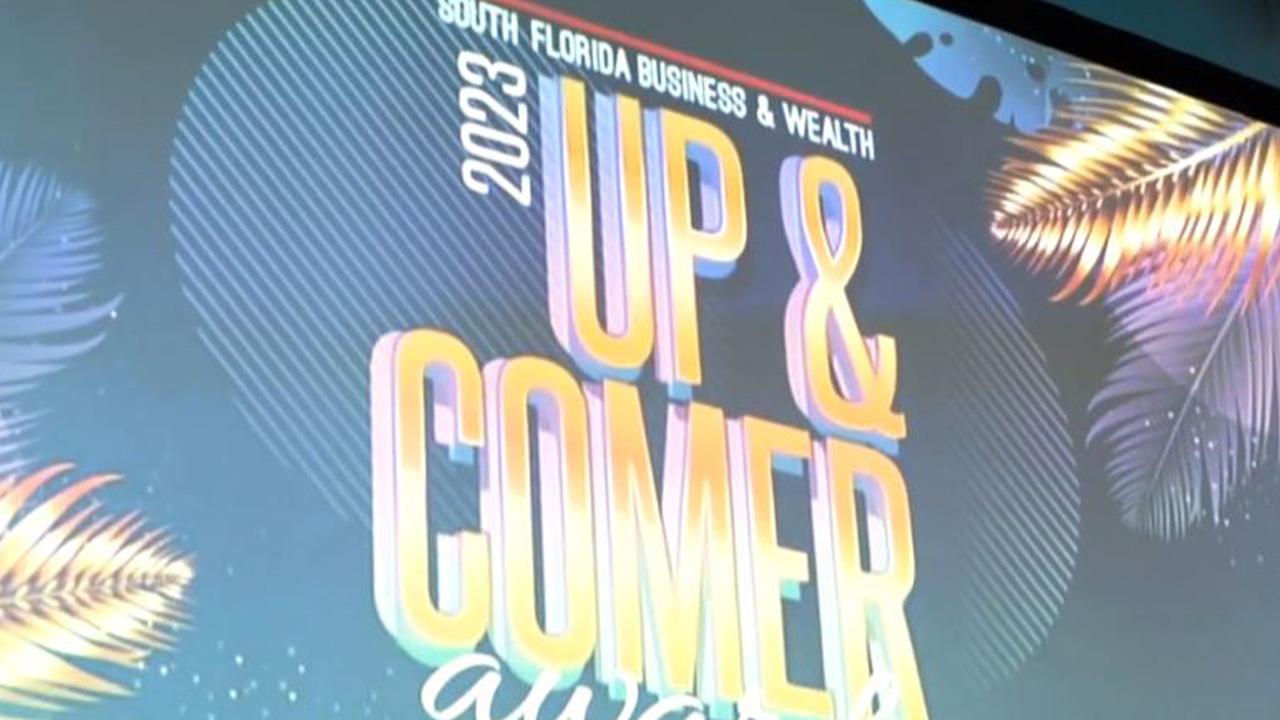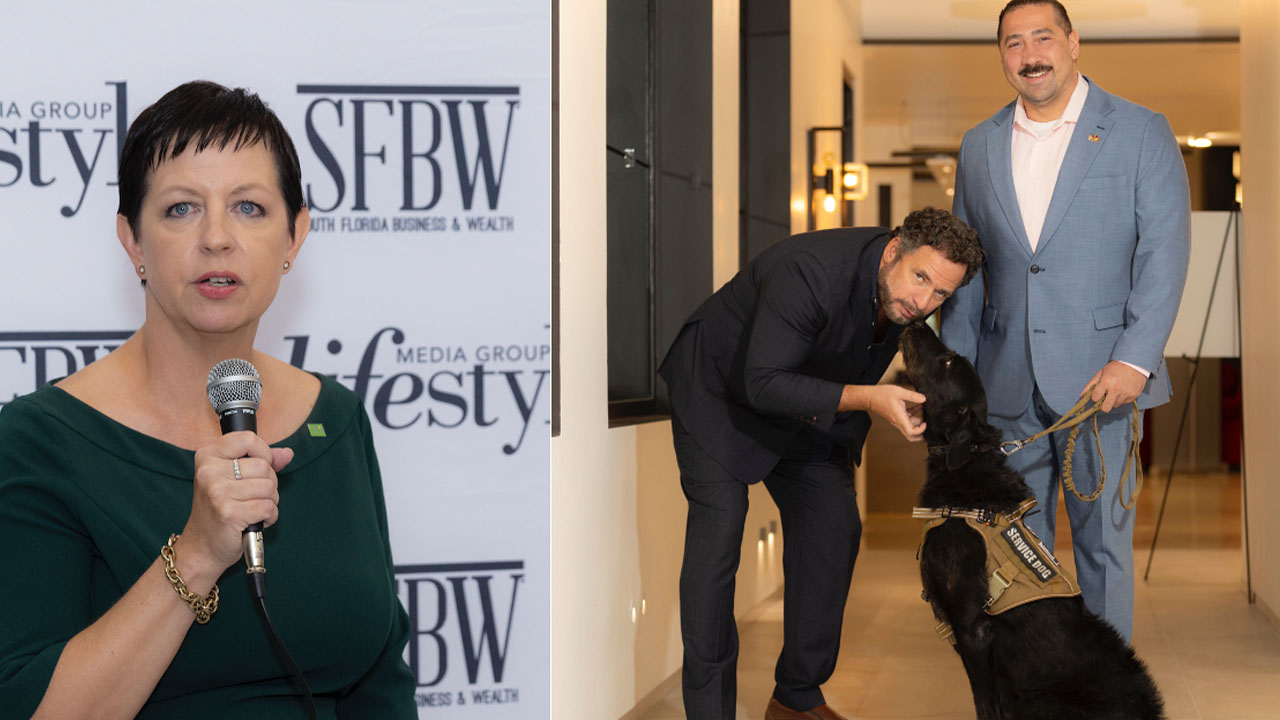[vc_row css_animation=”” row_type=”row” use_row_as_full_screen_section=”no” type=”full_width” angled_section=”no” text_align=”left” background_image_as_pattern=”without_pattern”][vc_column width=”2/3″][vc_column_text] Photography by Patrick Clinton
The panelists
Stan Black, senior vice president and chief security and information officer at Citrix.
Debra McCollough, chief human resources officer at Keefe McCullough CPAs and Trusted Advisors.
Dustin Jacobs, vice president of marketing at BrightStar Credit Union.
Frederick O’Malley, chief operating officer at the Shutts & Bowen law firm.
Jeff Klink, South Florida regional president for Valley National Bank.
David Josefsberg, partner at Century Risk Advisors, Risk Management and Insurance Solutions.
Raul Miguel, principal at Nperspective, a chief financial officer services provider.
William De Temple, founder and CEO of Antirion, a C-level business coaching services.
Rick Mancinelli, founder and CEO of Cloud Computing Concepts.
The following transcript was edited for clarity and brevity.
Following SFBW’s prestigious Apogee Awards, a group of honorees and sponsors met for networking and a roundtable discussion at law firm Greenspoon Marder’s headquarters in Fort Lauderdale. Editor-in-Chief Kevin Gale led the conversation, in which the room agreed that business is booming. While that’s the case, companies are evolving and adapting to keep up with technology and changes in consumer behavior.
What’s your business outlook for 2019 amid concerns about trade wars, a new Democrat majority in the House and rising interest rates?
Mancinelli: For us, we are very optimistic. Things are going well with us. We have a diverse customer base from law firms, accounting firms, country clubs and private aviation. And the theme across the board is growth. There are some concerns with the issue with China because a lot of tech is built there. We’ve already seen the impact of the first 10 percent tariffs on Chinese imports. It’s spurred a little bit of a buying spree before it, but I’m curious to see what happens when it hits 25 percent. As for the rising interest rates, they don’t affect us a whole lot because we are a monthly service.
McCollough: We also are extremely optimistic for the new year. The things we anticipate having the most problems with in 2019, however, is the job market. There are a lot of accountants graduating, and we need a lot of accountants. And the accountants have become like the IT folks—they don’t just move across the street for $5,000. So, you have to be extremely careful and competitive in benefits and salaries, and you have to treat them like they are rock stars. If you don’t, you can’t keep them.
Klink: We’ve moved up from historic lows that were with us for close to 10 years. Everybody needed to refinance at low rates, and folks buying homes saved a lot of money. The good news is that rates have moved up 100 basis points on the debt side. That is more expensive than it was a year ago.
The silver lining is savers—folks who have cash and equity—are finally being rewarded. Money market rates and CD rates are much higher. If you haven’t looked at your statements, look at them, because you can move your funds easily and you can earn upwards of 2 percent, whether it’s business savings or personal. That’s real money.
Industrywise, with the movement in interest rates, we’ve got to be more careful with commercial real estate financing. We do a lot of this with banks in South Florida. And while that sounds simple, that movement has impacted the cash flow that owners are rewarded with by owning and managing real estate. What banks have done prior to the rate move or rate increase was, we’ve built in a possible 3 percent increase on any deal we’ve underwritten. And we’ve been doing that for years. We’ve also seen more equity or cash into deals post-recession, and I think for South Florida, especially, that’s important if we do have any type of pullback. People are going to have real cash into their commercial real estate or residential properties, which gives them the incentive to ride things out if there is a downturn in the market of pricing.
Is your business currently hiring?
Klink: On the hiring side, it’s become more complicated and more expensive to get good people. Top performers are a hot commodity. To keep them, they want to know to that they have a path to growth and are loved by their company. Money isn’t the primary driver in their choice of a company anymore.
McCollough: It used to be you could dangle money in front of people, and they would say bye to your company. But now it’s a little complicated, because money doesn’t have the same value to millennials as it did for baby boomers. Now we have to be creative to get people into the jobs. And you would think that people right out of college would be easier to recruit, but they’re not. Their parents have taught them what they need from the job. But they’ve still got their parents there, reviewing their salary and benefit packages. My candidates tell me, “Let me talk to my parents about it.” I have parents calling me, even.
Justin, how’s your outlook for the year?
Jacobs: I don’t see the rising interest rates currently deterring our volume of loans. Consumer debt is high right now across the nation. I think it will continue to grow. We have a focus on deposits for 2019 to meet that loan volume we’re seeing. Coming from the financial industry, when you think of it, you think it’s boring and stuffy. But, from a recruiting standpoint, we’ve put in place a culture club, so we can have a more fun and appealing workspace with open layouts. Before things like that were almost nonexistent in the financial industry, and now you have to do that to be competitive.
Stan, what’s your outlook?
Black: We have five generations inside of our company, ages 19-72. I run IT and security. When we talk about benefits, time off, those are piece-and-parts. But we also have to recognize from my viewpoint that millennials work differently. They are highly collaborative. When they are working on project in schools, they’re not working on “my thesis,” they’re working on teams. So, what we started to do was not only do we recruit and setup environments in colleges to prepare that ingestion point, where we bring them in and let them see our environment. We do a lot of internships. And they start to vet us.
The other thought is, it’s not just about money. It’s about the benefits and the opportunities. From what I’m seeing now, millennials want to be part of a team. We have a lot of flexible environments set up that aren’t assigned to them. And they can work there if they want.
We are fortunate that we have the technology that allows our staff to work remotely. It’s really a case of recognizing what motives the millennials. I struggle with just setting everything up for the millennials because it’s interesting what the expectations are for my 72-year-old colleague; he’s worried about retirement and health. With the younger folks, they aren’t as focused on great health care because they are pretty much healthy.
Stan, Citrix has a sizeable office in Silicon Valley. What’s it like hiring people from there versus here?
Black: Well, there’s a significant trend—we are finding it easier to hire people from Silicon Valley because they can’t afford to live there no matter, which was a shock to me. The cost of living is really hard on them. They can come and work in one of our other locations or they can work remotely because we have a tremendous population who are 100 percent remote. And they can make more money and have a better lifestyle that they can work with.
It’s funny, because the West Coast was a 12- to 18-month rotation. They would move for 15 percent more in pay. They had résumés that were just scrolls: “I worked here for an hour and half.” But we are seeing less and less than that. We are able to entice more people, and what we were doing is, we have very expensive real estate there, but we don’t need to have as much square footage because we are able to work remotely.
Fred, what are you seeing at Shutts these days?
O’Malley: We’re seeing a tremendous difficulty in hiring. The recruiting from the Northeast we were able to do very well. And, lately, we haven’t been able to. We’ve gone back to the summer associate program where we’re recruiting on campus, which we abandoned during the Great Recession. We look at students who are in their second and third years and recruit them for summer jobs and getting a hook in them. We have a great environment, so it’s a great product to sell. We’ve been very successful in doing that.
On our support staff side, it’s been problematic trying to hire legal secretaries who are skilled, because the industry has pretty much died years ago. No one comes out of college and wants to be a legal secretary, even though it’s a great career path and the roles are changing.
The other thing that’s evolving rapidly is how we can work remotely. We have eight offices across the state. When we consider hours, the clients are demanding something different. Alternative fee arrangements and flat fees and those types of things. We don’t see people working 2,000 hours in the office. They have more choices of when they work and where they work, from the top to the bottom.
William, can you give us some insight on what different clients in different areas are experiencing?
De Temple: I spent the bulk of my career in California. We are still doing a large percentage of our business in the California market. And I see that market as more robust than anything else. One of those things I look at, and I haven’t done the research on Florida’s economy, but California in 2000 was the ninth-largest economy in the world, and recently it’s the fifth-largest economy in the world. And I’m looking at a massive amount of growth in California. That’s why I feel like we are still gaining a lot business there, whereas we are having a challenge growing the business in Florida. I’m not sure if it’s because I’m not seeing things properly, or it’s just a different culture.
Miguel: Nperspective is a different type of business than the other participants here. We started in Orlando and we also have an office in Tampa. We are growing our presence in South Florida. In terms of hiring, because of what we are, we are a group of seasoned financiers and CFOs that provides services to small and midsize companies who do not have CFOs leading them. We hand-pick the people we want to work with. Because we are seasoned professionals with more than 20 years’ experience, we don’t have any millennials on our team. That way we can leverage our experience and bring that to other companies to better serve their needs.
We are not specialized and work across a number of industries. So far, we’ve doubled in size in South Florida. Our clients bring us on because they are growing, and what we’ve seen is that the owner wants to do everything. Then after a certain point, the owner realizes they need help with the day-to-day operations, so they can focus on growing their company. During times of growth, we see there’s a greater need for financial services, especially in small businesses.
David, how’s the hiring process been for you?
Josefsberg: As a boutique insurance agency that really focuses on organic growth, we have attempted to hire some recent college graduates who are ambitious. And we haven’t seen a lot of success for those new hires, including interns that we have brought on board. It seems as though they need their parents to help them make decisions. It’s very obvious to me that we are looking at a group who isn’t prepared to take care of themselves, which is difficult in my business because it’s relationship-driven. You have a whole different set of rules of what it means to have a relationship with someone. When I’m asking one of my children to make a plan or do something and see them pull out their phones to text message, I wonder why they don’t just make a phone call instead, if they want an immediate response. There’s a big disconnect. As an organization, we’ve looked at our organic growth and how we can better use our resources to grow our business versus bringing in new individuals and having to count on them.
In banking, what are your plans in terms of building new branches and developing digital platforms?
Klink: In this tri-county area, pre-recession, we had 80 branches; now, we have approximately 40. This was either due to failure or traditional buyouts. What we are doing is we are continuing to invest in our digital platform because our consumers demand it. We have all the tools that make it convenient to bank with us, but we still are focused on being a client-centric bank. But if you need anything slightly out-of-the-box in our industry, you still need to talk to somebody about a critical piece so you want to make sure that it is handled correctly. As we move forward, we’ve had to balance our branches and digital efforts the best that we can. And we’ve made sure our branches are in strategic locations.
Jacobs: We have a similar philosophy. In our current market, and where we’ve developed our footprint in South Florida, we feel that it is very necessary to keep our branch presence because we do have people who want to come in and make the transaction with someone. We had a huge push for user experience on our digital platforms. Because now that’s a culture of expectation. You have all these fintech companies that are providing services that banking provides, so we will have to be able to provide it as well.
Our expansion is a little bit of a different philosophy. We are planning to expand in 23 counties across Florida, but there are no brick and mortar locations planned for these counties. It’s all going to be online-based and we’ve invested significantly in it. We plan to market specific products that are not necessarily services where you would need to go into a branch for. ♦
[/vc_column_text][/vc_column][vc_column width=”1/3″][vc_gallery interval=”0″ images=”28859,28858,28857,28856,28854,28853,28852,28851,28850,28849,28848,28847″ img_size=”full”][/vc_column][/vc_row]



